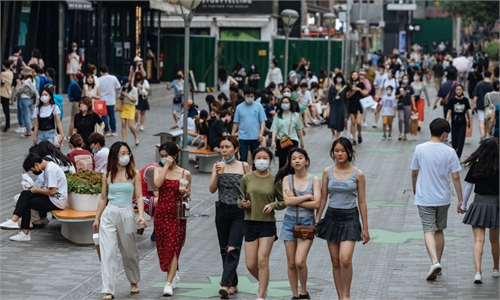China’s property market gradually rebounds during Dragon Boat Festival, as government supportive measures kick in
Support measures aim to boost confidence

China is seeking to maintain stability in the property market this year after the roller coaster ride of 2016, with measures to prevent surges in metropolises and the growing inventories in small cities.File photo:Xinhua
China's real estate market saw brisk business during the Dragon Boat Festival, with second-hand home transactions increasing from the previous month, industry insiders told the Global Times on Sunday, pointing to a gradual recovery amid intensifying efforts to boost the property market and stabilize housing and land prices.
Experts noted that since late May, the property market has been gradually improving. The transaction volume of new and second-hand homes is expected to show a month-on-month increase in June, with prices expected to be stable.
The Global Times learned that during the three-day holidays, more than 50 cities including Beijing, as well as Shenzhen and Guangzhou in South China's Guangdong Province, dialed up promotions to boost local property sales, after the release of supportive policies including eliminating restrictions on housing purchases and cutting mortgage rates for potential home buyers.
A staff member surnamed Zhang from a Beijing-based real estate agency told the Global Times that the number of people who came to see houses during the Dragon Boat Festival rose about 30 percent from a month ago, with transactions of second hand houses also increasing nearly 30 percent, but prices edged down a little bit.
The number of new home transactions dipped, with prices remaining unchanged, Zhang added, noting that due to stricter movement restrictions during COVID-19 flare-ups, fewer people visited new homes, which are mostly located in the suburbs.
The real estate market in Shenzhen also saw a rebound in terms of second-hand home transactions in recent days.
A Shenzhen-based agent said that, compared with the May Day holiday, more people came to look at properties during the weekend, after the city announced it would slash mortgage rates.
Data revealed by the Shenzhen Real Estate Intermediary Association showed that in May, the city's second hand house transactions stood at 2,801, with a 10.3 percent year-on-year growth rate, indicating a gradual recovery of market confidence.
Moreover, with the implementation of favorable policies to shore up property sales, a number of new housing projects have been launched, which has eased the tight supply situation.
"However, not many people have purchased homes, as they remain cautious," the agent added, noting that the total volume of second hand housing transactions in Shenzhen in the first five months of this year was equivalent to that in April 2020, when the city battled its worst outbreak of the pandemic.
Experts noted that with sufficient supply of new and second hand homes, transactions will edge up.
For the time being, prospective buyers are still in a wait-and-see mode, as economic growth expectations face uncertainty, Yan Yuejin, research director at Shanghai-based E-house China R&D Institute, told the Global Times on Sunday, noting that prices of new and second-hand homes will remain stable in the first three quarters.
"The real estate market is gradually improving, and it will emerge from the slump it experienced in April and May. Transactions of new and second-hand homes are expected to show growth in June, boosted by the central and local governments' strong supportive policies," Yan added.
On May 15, the People's Bank of China, the country's central bank, moved to lower mortgage rates for first-time home buyers by 20 basis points (bps) off the benchmark loan prime rate, reiterating its stance that housing is for living, not for speculation, in order to revive the housing market across China as part of a broader pro-growth push.



